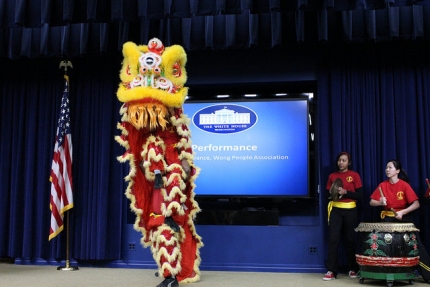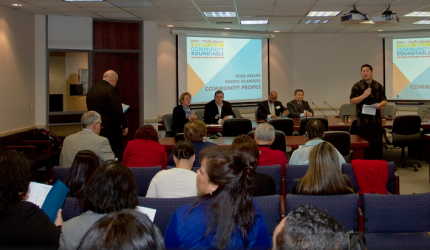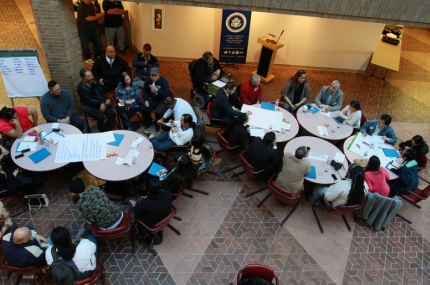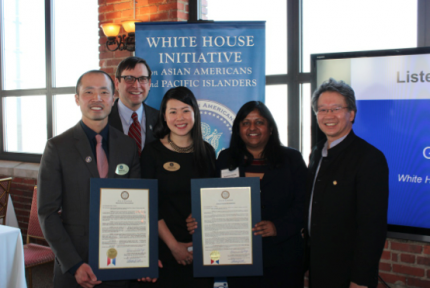Initiative on Asian Americans and Pacific Islanders Blog
Recap: 2015 National AAPI Community Google+ Hangout
Posted by on March 4, 2015 at 4:53 PM ESTOn February 25, the White House Initiative on Asian Americans and Pacific Islanders held its second National Asian American and Pacific Islander (AAPI) Community Google+ Hangout. I was joined by Aditi Hardikar, Associate Director at the White House Office of Public Engagement; Konrad Ng, Director of the Smithsonian Asian Pacific American Center; and Billy Dec, member of the President’s Advisory Commission on AAPIs.
During the Hangout, Konrad shared the AAPI Heritage Month theme, #APAEverywhere, and we also highlighted the White House Summit on AAPIs on May 12 and our new Federal Agency Accomplishments Report.
Learn more aboutCalling All Students: Apply for the Summer 2015 White House Initiative on Asian Americans and Pacific Islanders Internship Program
Posted by on February 23, 2015 at 2:32 PM EST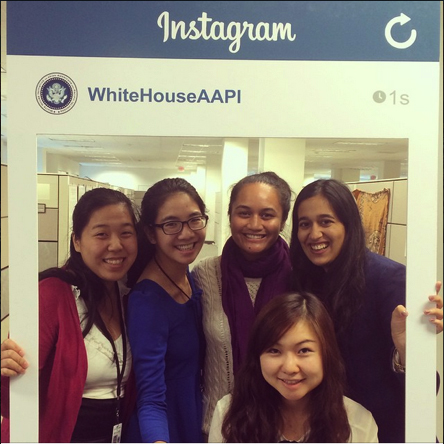
As America’s population becomes increasingly diverse, it is important to have this diversity reflected in the federal workforce. Although Asian Americans and Pacific Islanders (AAPIs) comprise 6 percent of the U.S. population, they make up only 3 percent of the Senior Executive Service (SES), the highest ranks of federal government.
As part of the White House Initiative on Asian Americans and Pacific Islanders’ work to strengthen federal workforce diversity, we want to highlight federal internship opportunities. We hope to usher more students into public service to ensure diverse voices are represented in the federal government, and the needs of the AAPI community are reflected in its’ programs and policies.
At the Initiative, we are currently seeking full-time summer student interns in Washington, D.C., and Seattle, WA. The Initiative is responsible for the implementation of the President's Executive Order 13515, which includes coordinating executive branch efforts to improve the quality of life of underserved AAPIs through increased participation in federal programs.
Learn more aboutCelebrating Lunar New Year at the White House
Posted by on February 20, 2015 at 6:32 PM ESTYesterday evening, we hosted the first-ever Lunar New Year celebration at the White House. Members of Asian American and Pacific Islander community from across the country joined together to ring in the first day of the Lunar New Year with keynotes from Administration officials, a discussion with diverse AAPI leaders, and three lively cultural performances. President Obama also sent his greetings by video message.
Learn more aboutPresident Obama Sends Warm Wishes for the Lunar New Year
Posted by on February 18, 2015 at 6:00 PM ESTToday, the White House released a video message from President Obama welcoming the Lunar New Year:
Echoing the President’s message, the White House Initiative on Asian Americans and Pacific Islanders (AAPIs) and the President’s Advisory Commission on AAPIs send our best wishes to all those celebrating the Lunar New Year.
Learn more aboutEngaging in Robust Dialogue on Diverse Issues Affecting Utah's AAPI Communities
Posted by on February 18, 2015 at 10:25 AM ESTWith rich diversity, history, and the strength of unity, Utah’s Asian American and Pacific Islander (AAPI) community came together on January 31, 2015 for a series of roundtable discussions with federal representatives on health, immigration, small business opportunities, education, and civil rights.
With topics as diverse as the community itself, the issues raised by more than 90 community leaders offered immense insight to Utah’s AAPI community needs and the grassroots strategies that will be needed to address them. Therefore it should not be incumbent upon the community to look for the right government agencies to address these issues. The White House Initiative on AAPIs (WHIAAPI)’ Regional Interagency Working Group (RIWG) was formed for this very purpose. The RIWG, comprised of federal officials located across the country, is committed to engaging local communities and connecting them to federal resources, with the goal of creating “no wrong doors” approaches to government services.
Robust discussions led by community leaders at the roundtables gave the topics breadth and depth. RIWG members listened and discussed the various resources available within their agencies. Community members at each table presented their perspectives on issues, such as language access for government services, bullying, health services, business and economic development, access to educational opportunities, disaggregated data, and immigration. Based on these conversations, RIWG members will coordinate strategic follow-ups to address the needs.
Preceding the roundtable discussions, on January 30, 2015, WHIAAPI convened an Affordable Care Act (ACA) enrollment event in Salt Lake City’s Sorenson Unity. The U.S. Department of Health and Human Services (HHS), Utah Department of Health, National Togan American Society, and Take Care Utah provided extensive outreach to nearly 100 members from the AAPI communities on signing up for affordable health coverage through the Health Insurance Marketplace. Navigators and certified application counselors gave seminars and were on hand to help facilitate on-site enrollment.
The enrollment event was something for the whole family. It drew families from all walks of life from the richly diverse communities of Salt Lake City. It was a place where the community from every background could sit down, share a meal, and talk with federal representatives about general and mental health issues and the options available for them. While the adults listened to the informational sessions on the Affordable Care Act and Utah’s Health Insurance Marketplace, children enjoyed a movie. This event reemphasized that having quality affordable health coverage affects the entire family.
--
Paul Chang is a Regional Advisor at the White House Initiative on Asian Americans and Pacific Islanders.
Meeting the Asian American and Pacific Islander Community of Cleveland
Posted by on February 18, 2015 at 9:46 AM ESTAccording to the U.S. Census Bureau, Asian Americans and Pacific Islanders (AAPIs) represent around 5.5% of Ohio’s population. Furthermore, AAPIs are one of the state’s fastest-growing demographic groups, having grown by 40 percent between 2000 and 2009.
As part of the White House Initiative on Asian Americans and Pacific Islanders (WHIAAPI)’s regional engagement efforts, particularly in cities with large and emerging AAPI communities, WHIAAPI held a Cleveland AAPI Community Listening Session on January 28, 2015. The Listening Session was held at the Ariel International Center in downtown Cleveland and drew nearly 100 community leaders from across business, nonprofit, and public sectors.
Over a dozen federal agencies were represented, including the U.S. Citizenship and Immigration Services, U.S. Department of Education, Equal Employment and Opportunity Commission, Small Business Administration, Minority Business Development Agency (MBDA), Occupational Safety and Health Administration, U.S. Department of Labor Wage and Hour Division, Social Security Administration, U.S. Department of Housing and Urban Development, U.S. Department of Health and Human Services, and U.S. Department of Veteran Affairs. Each agency provided an overview of its work particularly with services to the AAPI community, such as SSA’s Multilanguage Gateway that includes translated materials and free interpreter services or MBDA’s Cleveland Business Center that provides free counseling to local businesses.
Federal representatives and community members then participated in break-out sessions to dive deeper into the issues of housing, education, immigration, labor and workers’ rights, health and human services, social security, and business. We greatly valued the perspectives of the community members and worked together to brainstorm recommendations on how the federal government can address key challenges. In the upcoming months and as a follow-up to the Listening Session, then White House Initiative on AAPIs looks to provide tailored technical assistance and trainings to the Cleveland community. We look forward to continuing our collaboration with Cleveland as we work to open the federal government’s doors to all AAPIs.
--
Michael Byun is a member of the President’s Advisory Commission on Asian Americans and Pacific Islanders.
- &lsaquo previous
- …
- 2
- 3
- 4
- 5
- 6
- 7
- 8
- 9
- 10
- …
- next &rsaquo
White House Blogs
- The White House Blog
- Middle Class Task Force
- Council of Economic Advisers
- Council on Environmental Quality
- Council on Women and Girls
- Office of Intergovernmental Affairs
- Office of Management and Budget
- Office of Public Engagement
- Office of Science & Tech Policy
- Office of Urban Affairs
- Open Government
- Faith and Neighborhood Partnerships
- Social Innovation and Civic Participation
- US Trade Representative
- Office National Drug Control Policy
categories
- AIDS Policy
- Alaska
- Blueprint for an America Built to Last
- Budget
- Civil Rights
- Defense
- Disabilities
- Economy
- Education
- Energy and Environment
- Equal Pay
- Ethics
- Faith Based
- Fiscal Responsibility
- Foreign Policy
- Grab Bag
- Health Care
- Homeland Security
- Immigration
- Innovation Fellows
- Inside the White House
- Middle Class Security
- Open Government
- Poverty
- Rural
- Seniors and Social Security
- Service
- Social Innovation
- State of the Union
- Taxes
- Technology
- Urban Policy
- Veterans
- Violence Prevention
- White House Internships
- Women
- Working Families
- Additional Issues
